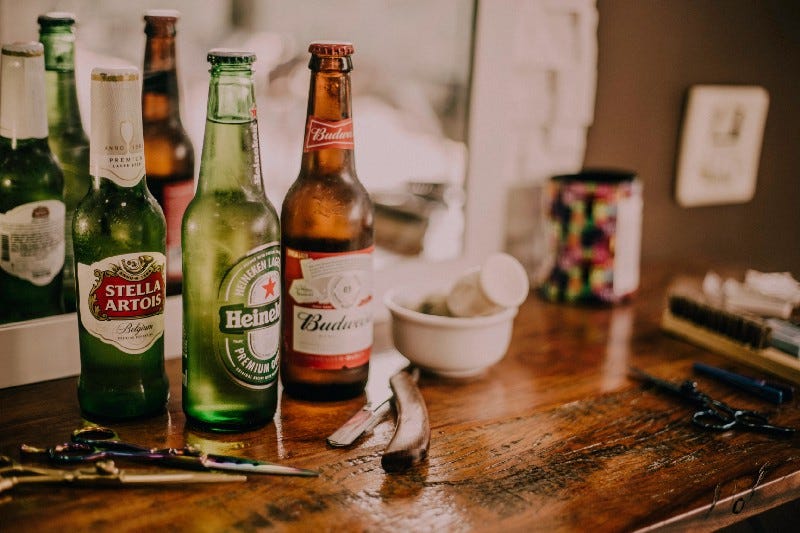The Heineken Family Fortune Was Founded on Slavery
It's time for reparations

Charlene de Carvalho-Heineken is the wealthiest person in the Netherlands.
As you can probably guess from her name, she owns a 23% stake in the green-bottled brewing giant Heineken. (For those who are counting, her share is worth $17.8 billion.)
Heineken is not an ethical company. It’s a giant alcohol conglomerate that’s swallowed more than 300 of its competitors across 190 countries, including Amstel, Birra Moretti, Dos Equis XX, Tiger, Strongbow, Orchard Thieves, Bulmers, Fosters, Edelweiss, Sol, Lagunitas, Red Stripe, Gösser, and hundreds more. (And yes, they’ve been fined several times for running a price-fixing cartel.)
Like all multinational monopolies, it will not stop until it is stopped.
And to be clear, Charlene de Carvalho-Heineken doesn’t make beer.
She doesn’t harvest grain, either.
Or label bottles.
Or package shipments.
Or run marketing campaigns.
She’s not even the CEO or CFO.
She just collects $100+million per year as an executive director via a complex legal structure that keeps her in total control of the company.
Unlike Heineken’s 84,000 hard-working contributors, Charlene de Carvalho-Heineken didn’t earn her eleven-figure net worth.
She just inherited it from her father.
Freddy Heineken.
What a guy.
They literally made movies about him after he survived a kidnapping.
Freddy actually did a bit of work for the company, serving as CEO for eighteen years, where he continually boosted the stock price by buying out competing breweries and shutting them down.
He’s the one who created the sneaky legal structure to keep things in his family’s control so the conglomerate can be run like a dictatorship instead of a democracy where each shareholder gets a fair vote.
But he never actually made beer.
Or labeled bottles.
Or packaged shipments.
Or ran marketing campaigns.
He just retired as one of the richest men in the nation, with several billion to his name.
All of which he inherited from his father.
Henry Heineken.
What a great name.
He’s the one who brought in the monopoly’s industrial-scale automation, dove into seed germination manipulation, and meddled in politics as a senator on the side.
These are the kinds of things one can do when you’re a multi-millionaire.
All inherited from your father.
Gerard Adriaan Heineken was just 22 years old when he founded Heineken in 1864.
No wait, sorry…
When he took control of a brewery called The Haystacks and renamed it.
Gerard didn’t make beer either, nor did he discover the special bottom-fermenting yeast that gives Heineken its distinct flavor. That honor belongs to one Dr. H. Elion — whose Wikipedia page just re-directs to Heineken. Not only did the company copyright a piece of nature, but they still claim on their website that they discovered their core ingredient, making no mention of Dr. Elion at all.
Gerard, of course, didn’t have a money tree in his backyard to just buy out a working Amsterdam brewery.
He got the money from his wealthy parents, one of which was his mother, Anna Geertruida van de Paauw, who owned shares in brutal slave plantations in Guyana and Suriname.
Which she inherited from her deceased first husband.
Heineken has never publicly acknowledged the fountainhead of their family’s wealth, which included nearly 300 slaves, a 500-acre coffee plantation, and a plantation with the troubling name of Schumacher’s Lust.
When slavery was eventually abolished by the British Empire in the 1830s, British taxpayers paid £993 in “reparations”… to the Heineken’s ancestors for their loss of free slave labor.
(Ironically, the family now funds several history prizes while regularly scrubbing racism controversies off of their Wikipedia page.)
Heineken’s headquarters are in Amsterdam, a city which itself was a major shareholder in the slave trade, with the beautiful canals and locks of that grand city being financed with slave dollars from the world's first stock-issuing monopoly, the Dutch East India Company.
But that’s a story for another day.
Calls to action
“Every billionaire is a policy failure.” — Dan Riffle
Heineken isn’t the only Dutch company with ties to slavery. (Or British company. Or French, Spanish, American, etc.)
We need a well-funded U.N. commission to do a forensic deep-dive into the history and accounting of Heineken and hundreds of other multinational corporations before they destroy the evidence forever.
Then, reparations must be paid on all fortunes with proven links to slavery, war, and human rights abuses. (Yes, this includes Queen Elizabeth Mountbatten-Windsor’s outrageous Rothschild-managed fortune.)
In the meantime…
We need a massive inheritance tax to communicate the message that people should be active contributors instead of living in luxury thanks to outrageous privilege.
And a wealth tax to put a cap on unlimited wealth hoarding while one million new people move into slums every single day.
And a giant legislative hammer to smash the monopolies that strangle competition, stifle innovation, and avoid taxation.
And democratic shareholding, and a fairer pre-distribution of ownership to the workers who create 100% of the value of companies like Heineken.
Our global economy is jam-packed with people like Charlene de Carvalho-Heineken — billionaire parasites who leech untold wealth from the working, struggling, contributive, creative masses.
Sadly, no one wants to talk about the fact that the richest woman in the Netherlands “earned” her fortune through centuries of wealth extraction.
No…
We call it the American Dream.
If you think this article is important, please forward it to a friend and share it on social media.

